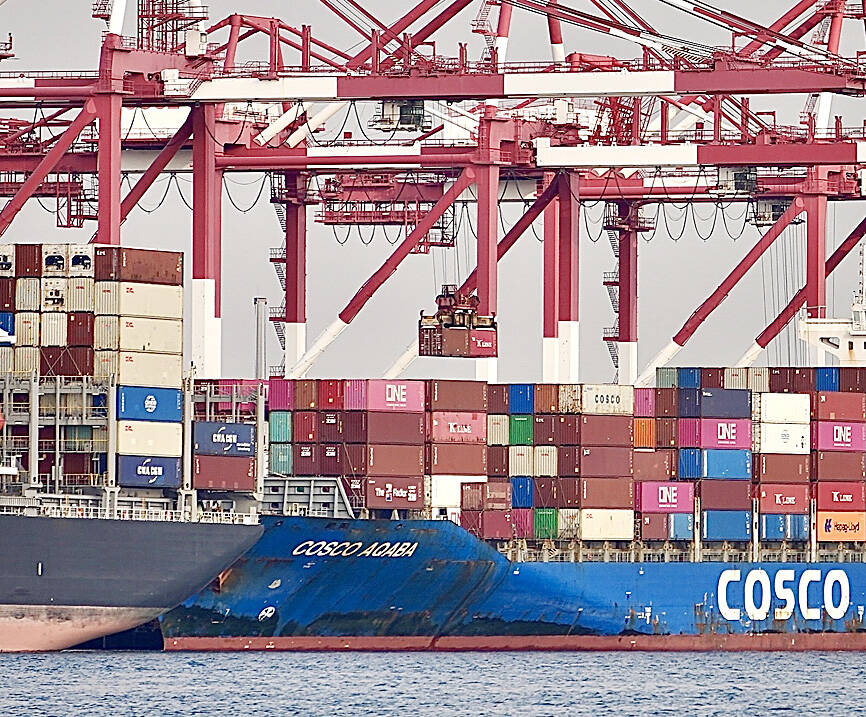Taiwan’s GDP is forecast to grow 2.9 percent this year, with the adverse effects of US President Donald Trump’s “reciprocal” tariffs expected to become more apparent in the second half of the year, the Taiwan Research Institute (TRI) said on Friday.
The institute’s forecast is lower than the Directorate-General of Budget, Accounting and Statistics’ estimate late last month of 3.1 percent growth.
Local economic growth is expected to slow in the second half of the year, as rush orders from foreign buyers seeking to avoid tariffs likely shrink as Washington’s tariff policies become clearer, the TRI said.

Photo: CNA.
Trump on April 2 announced reciprocal tariffs on countries that have high trade surpluses with the US. That included a 32 percent import duty on goods from Taiwan, but a week later, Trump announced a 90-day pause to allow negotiations for a lower levy.
TRI president Wu Tsai-yi (吳再益) said Taiwan is expected to face growing challenges in the second half of this year, with a decline in orders.
The institute forecast that Taiwan’s economy is likely to grow 4.95 percent in the second quarter after growing 5.34 percent in the first quarter.
However, growth is expected to slow sharply to 0.78 percent in the third quarter and 0.84 percent in the fourth quarter, it said.
Taiwan’s exports in merchandise and services are expected to increase 9.82 percent this year, on the back of solid global demand for emerging technologies, such as artificial intelligence applications and high-performance computing devices, it said.
Strong global demand for tech gadgets prompted local manufacturers to invest more in boosting production capacity, the institute said, adding that private investment would grow 4.54 percent this year, with capital formation, which includes private and public investment, forecast to grow 4.57 percent.
Uncertainties over the global economy have sent ripples through the local stock market and dampened consumer sentiment this year, which would limit private consumption in Taiwan to grow only 1.5 percent, it said.
TRI founder Liu Tai-ying (劉泰英) said an unpredictable Trump is expected to add more uncertainty to the global economy, while the weakness of the US dollar has led to a stronger New Taiwan dollar, with foreign exchange losses expected to place pressure on Taiwan’s exporters and life insurance companies, which hold large foreign assets.
The institute forecast that the exchange rate of the NT dollar to the greenback would hit an annualized average of NT$30.69 this year, compared with NT$32.11 last year.
In addition, the consumer price index would grow 1.98 percent this year, below the 2 percent alert set by the central bank, it said.

TECH TITAN: Pandemic-era demand for semiconductors turbocharged the nation’s GDP per capita to surpass South Korea’s, but it still remains half that of Singapore Taiwan is set to surpass South Korea this year in terms of wealth for the first time in more than two decades, marking a shift in Asia’s economic ranks made possible by the ascent of Taiwan Semiconductor Manufacturing Co (TSMC, 台積電). According to the latest forecasts released on Thursday by the central bank, Taiwan’s GDP is expected to expand 4.55 percent this year, a further upward revision from the 4.45 percent estimate made by the statistics bureau last month. The growth trajectory puts Taiwan on track to exceed South Korea’s GDP per capita — a key measure of living standards — a

Samsung Electronics Co shares jumped 4.47 percent yesterday after reports it has won approval from Nvidia Corp for the use of advanced high-bandwidth memory (HBM) chips, which marks a breakthrough for the South Korean technology leader. The stock closed at 83,500 won in Seoul, the highest since July 31 last year. Yesterday’s gain comes after local media, including the Korea Economic Daily, reported that Samsung’s 12-layer HBM3E product recently passed Nvidia’s qualification tests. That clears the components for use in the artificial intelligence (AI) accelerators essential to the training of AI models from ChatGPT to DeepSeek (深度求索), and finally allows Samsung

READY TO HELP: Should TSMC require assistance, the government would fully cooperate in helping to speed up the establishment of the Chiayi plant, an official said Taiwan Semiconductor Manufacturing Co (TSMC, 台積電) yesterday said its investment plans in Taiwan are “unchanged” amid speculation that the chipmaker might have suspended construction work on its second chip packaging plant in Chiayi County and plans to move equipment arranged for the plant to the US. The Chinese-language Economic Daily News reported earlier yesterday that TSMC had halted the construction of the chip packaging plant, which was scheduled to be completed next year and begin mass production in 2028. TSMC did not directly address whether construction of the plant had halted, but said its investment plans in Taiwan remain “unchanged.” The chipmaker started

MORTGAGE WORRIES: About 34% of respondents to a survey said they would approach multiple lenders to pay for a home, while 29.2% said they would ask family for help New housing projects in Taiwan’s six special municipalities, as well as Hsinchu city and county, are projected to total NT$710.65 billion (US$23.61 billion) in the upcoming fall sales season, a record 30 percent decrease from a year earlier, as tighter mortgage rules prompt developers to pull back, property listing platform 591.com (591新建案) said yesterday. The number of projects has also fallen to 312, a more than 20 percent decrease year-on-year, underscoring weakening sentiment and momentum amid lingering policy and financing headwinds. New Taipei City and Taoyuan bucked the downturn in project value, while Taipei, Hsinchu city and county, Taichung, Tainan and Kaohsiung